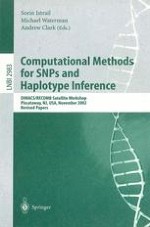2004 | OriginalPaper | Buchkapitel
Inferring Piecewise Ancestral History from Haploid Sequences
verfasst von : Russell Schwartz, Andrew G. Clark, Sorin Istrail
Erschienen in: Computational Methods for SNPs and Haplotype Inference
Verlag: Springer Berlin Heidelberg
Enthalten in: Professional Book Archive
Aktivieren Sie unsere intelligente Suche, um passende Fachinhalte oder Patente zu finden.
Wählen Sie Textabschnitte aus um mit Künstlicher Intelligenz passenden Patente zu finden. powered by
Markieren Sie Textabschnitte, um KI-gestützt weitere passende Inhalte zu finden. powered by
There has been considerable recent interest in the use of haplotype structure to aid in the design and analysis of case-control association studies searching for genetic predictors of human disease. The use of haplotype structure is based on the premise that genetic variations that are physically close on the genome will often be predictive of one another due to their frequent descent intact through recent evolution. Understanding these correlations between sites should make it possible to minimize the amount of redundant information gathered through assays or examined in association tests, improving the power and reducing the cost of the studies. In this work, we evaluate the potential value of haplotype structure in this context by applying it to two key sub-problems: inferring hidden polymorphic sites in partial haploid sequences and choosing subsets of variants that optimally capture the information content of the full set of sequences. We develop methods for these approaches based on a prior method we developed for predicting piece-wise shared ancestry of haploid sequences. We apply these methods to a case study of two genetic regions with very different levels of sequence diversity. We conclude that haplotype correlations do have considerable potential for these problems, but that the degree to which they are useful will be strongly dependent on the population sizes available and the specifics of the genetic regions examined.
